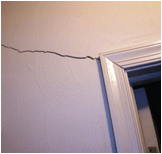Wall cracks may appear because of house settling or even poor structural design. Often the underlying problem is foundation-related. The soil under the foundation may shift because it was never properly prepared before the foundation was installed.
Soil Movement
Water pressure causes soil shift and movement. When soil is overly saturated with water it expands, then as it eventually dies out, the soil contracts. This type of soil movement exerts a hydrostatic pressure on the foundation and can cause cracks in walls in the foundation and the basement walls as well as in walls of the upper level rooms. Soils with high clay concentrations are particularly susceptible to expansion and contraction. By reducing the amount of water that flows into the soil underneath the foundation, you can help mitigate damage caused by soil shift and movement.
Proper exterior water management can reduce foundation problems, which in turn will reduce interior issues such as cracks in walls, bowing walls, crooked doors, warped floors and even bugs in the basement. Another consideration for managing soil shift is waterproofing foundation walls, basement wall repair or upgrading your drainage system.
Preventing Water Damage

To determine the underlying issues causing your cracks in walls, consult a qualified home repair specialist. You may need a foundation inspection, which can help determine the best course of action to fix the problems.
